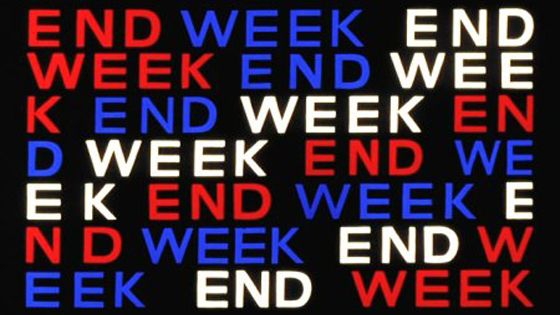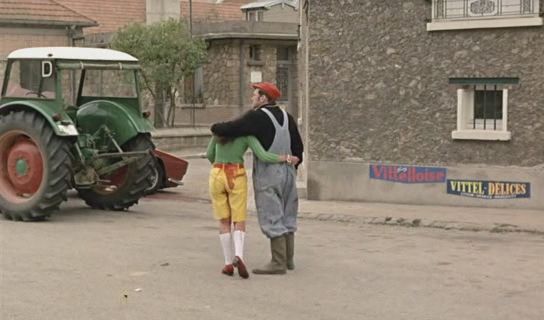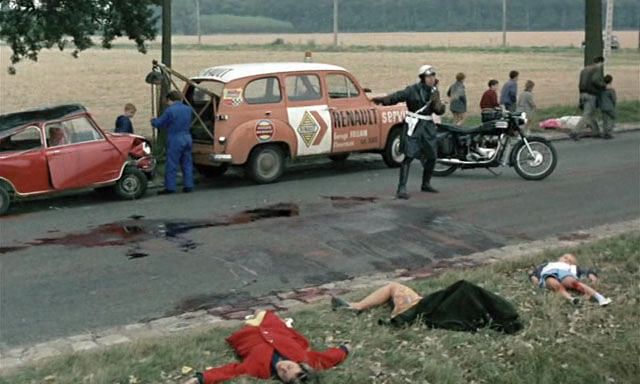Friday, September 7, 2012
Week End
Week End
1967
Director: Jean-Luc Godard
Starring: Mirielle Darc, Jean Yanne
I’m not a fan of French New Wave. I know, right? How can I consider myself a fan of films if I don’t pee myself over French New Wave films? Well, it’s true. I can absolutely appreciate everything that the French New Wave did to change film, yet I’d never count a single one of them amongst my favorites. I do not enjoy them. Godard, in particular, is troubling for me. I have never felt entertained or amused or even moved by a Godard film. Instead, I tend to just sit there with a look of “WTF?” on my face. Have I completely ruined any credibility I may have had by now?
The “plot” is about Roland (Yanne) and Corinne (Darc), an upper class married couple who openly want to murder the other. They go for a getaway on a weekend to visit her father, who they also want dead, and along the way, increasingly tragic and violent (and bizarre) things happen to them.
To me, when I think French New Wave, and ESPECIALLY Godard, I think about rule-breaking. To me, that was what the Nouvelle Vague was all about, and by breaking tried and true cinematic “rules,” it managed to move cinema light years into the future. Like any Godard film, there is all kinds of rule-breaking in Week End, both cinematically, narratively, and sociologically.
The early monologue where Corinne describes in cold detail a past sexual encounter is most definitely about rule breaking. The content of the monologue gets pretty dirty and ultimately pretty absurd; you’re not *supposed* to talk that dirty in a film. Corinne is wearing her underwear in this scene, but she’s utterly unsexy in her delivery. Where I see Godard really playing with conventions and shoving them entirely out the window is in his use of background music. As she starts to talk in the very long, unbroken shot, eerie and suspenseful music starts to build. It reaches its crescendo. It stops. By this point, we are now thinking to ourselves that the scene is over. The music has told us that the scene is over. But it isn’t. Corinne keeps talking. She wasn’t done; she wasn’t even close to being done. After some background silence while she keeps talking, the music starts again, builds again, crescendos again, and once again it stops before the scene is finished.
Continuing on the topic of musical rules that Godard breaks, there is also a small scene with a Mozart piano sonata. As the scene opens, we hear a lovely piano piece and the camera slowly moves around a small country village. With that sort of visual and aural cue, you expect (I did, at least) that this music is part of the soundtrack. Lo and behold, though, as the camera continually tracks, we see there is an actual piano and pianist in the town square, and townspeople are gathered around listening to it. Godard has given us every possible cue that this is soundtrack, but it is not. The pianist talks about some musical history and theory, then blames his wrong notes on his cigar. Nearly the same idea is repeated later in the film with a drum set in the middle of the woods.
Godard was also consciously aware, like all other Nouvelle Vague directors, of pointing out that his film was indeed a film. It is not supposed to feel like a book or real life. He reminds us, time and time again, that we are watching a movie. Jean-Pierre Leaud turns to the camera and recites revolutionary statements directly to the camera, breaking the fourth wall. A young couple in a car pulls up to our stranded main couple and asks, “Is this a film or reality?” When told it is a film, they drive away. Scenes are interrupted by intertitles many times; usually, these intertitles are completely useless and do nothing to further the story. They just interrupt the scene for the hell of it. Scenes fade to black, but the scene is unfinished, so we fade back from black to what we were watching before. The camera moves along a road in a tracking shot, only to immediately track back because there was nothing for the camera to track in the first place. All of these things, and many others, break the rules of classical cinema.
In terms of thematic elements, Godard is very angry at, well, lots of things. Week End is an indictment of the upper class, of modern French society, of capitalism, of socioeconomic problems. Corinne and Roland are well-off, and they are horrible people. They are selfish and self-absorbed, utterly unconcerned with people and events that have nothing to do with themselves. They drive past car crash after car crash (symbolic, perhaps, of the decay of modern society) with bodies bloodily littered at the side of the road, and they do not blink. They use anything at their disposal to get their way, including trading sexual favors for a ride. People literally die around them, and they care not, but belligerently yell at anyone who gets in their way. The film is also crazily violent. People are completely incompetent of working through any minor argument logically, and resort to beat downs and gunfire awfully fast. Godard plays this for laughs, but also clearly seems to be drawing attention to society’s inability to solve problems except by resorting to outrageous violence. The finale of the film shows a complete desertion of any sort of societal rules, with sequences of butchering of all sorts, references to the horrors of the French Revolution, and the downfall of our main couple.
There’s nice color work in Week End. Nearly every scene contains the primary colors red, yellow, and blue, and many shots also include white for the French and American flags. Red for communism, a huge yellow and red Shell Gasoline truck in a traffic jam, a blue sweater and a yellow scarf for Corinne, yellow and red paint being sprayed on one another in an argument, the constant red blood being spilled on the road.
This is not a commercial movie. Godard didn’t make commercial movies. It wasn’t what he was interested in doing in the least; heck, he wasn’t even trying to remotely entertain you. He’s all about making a provocative statement and, well, that’s about it. That also sums up pretty well why I’m not a big fan. I utterly respect how, by really playing with established rules, French directors changed so many techniques and changed the entire landscape of cinema, but I don’t go for Godard on my own. Week End is bizarre and feels more than a little experimental. It is full of black humor and violence so ridiculous, you really must laugh. But it’s not an enjoyable film to watch. Is it supposed to be? I highly doubt it. This is Godard, after all. He’s constantly trying to remind you that you are watching a movie, and a new and different one at that.
Arbitrary Rating: 6/10. I tried rewatching this by itself, but quickly decided to turn the commentary on. It helped A LOT. If anyone out there is like me in terms of finding French New Wave films a bit troublesome, I can say that I got a heck of a lot more out of Week End by hearing a scholar talk about it. I’m certainly not a convert, but at least I feel like I got a bit more of what Godard was trying to say.
Labels:
1001 movies,
1960s,
1967,
6 out of 10,
foreign,
french,
godard,
week end
Subscribe to:
Post Comments (Atom)



Godard is one of those directors I think of as being a lot more important than he is good. I liked Breathless and...well, I liked Breathless. Band of Outsiders (not on the list) was decent.
ReplyDeleteI find a lot more to like in Truffaut. But I do get what you're saying about the French New Wave. I get why it's important, and breaking rules is fun and all, but with no rules, it just ends up being...stuff.
Truffaut's films have heart; Godard, not so much. Godard is angry and black (ESPECIALLY IN THIS MOVIE), whereas Truffaut, while cynical, still seems to be optimistic. I DEFINITELY agree there is a lot more to like in Truffaut's work.
DeleteI've heard a lot about Band of Outsiders, so I suppose one of these days I'll get around to seeing it.
I liked Breathless better than this one too. But I could not STAND Pierrot le Fou. Or 2 or 3 Things I Know About Her.
Yeah, I'm not a Godard fan. I appreciate him for sure, but like him? Not so much.